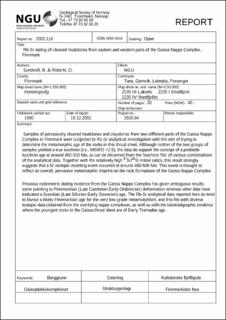Rb-Sr dating of cleaved mudstones from eastern and western parts of the Gaissa Nappe Complex, Finnmark
Report

Åpne
Permanent lenke
https://hdl.handle.net/11250/2665235Utgivelsesdato
2002Metadata
Vis full innførselSamlinger
- Rapporter [5057]
Sammendrag
Samples of pervasively cleaved mudstones and claystones from two different parts of the Gaissa Nappe Complex in Finnmark were subjected to Rb-Sr analytical investigation with the aim of trying to dtermine the metamorphic age of the rocks in this thrust sheet. Although neither of the two groups of samples yielded atrue isochron (i.e., MSWD 2.5), the data do support the concept of a probable isochron age at around 480-500 Ma, as can be discerned from the \"isochron fits\" of various combinations of the analytical data. Together with the relatively high 87Sr\/86Sr initial ratios, this results strongly suggests that a Sr-isotopic resetting event occurred at around 480-500 Ma. This event is throuht to reflect an iverall, pervasive metamorphic imprint on the rock formations of the Gaissa Nappe Complex. Previous radiometric dating evidence from the Gaissa Nappe Complex has given ambiguous results, some pointing to Finnmarkian (Late Cambrian-Early Ordovician) deformation whereas other data hace indicated a Scandian (late Silurian-Early Devonian) age. The Rb-Sr analytical data reported here do tend to favour a likely Finnmarkian age for the very low-grade mertamorphism; and this fits with viverse isotopic data obtained from the overlying nappe complexes, as well as with the biostratigraphic evidence where the youngest rocks in the Gaissa thrust sheet are of Early Tremadoc age.
